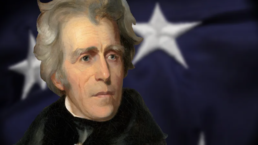These life stories may contain descriptions of childhood trauma and abuse, as well as images, voices and names of people now deceased. If you need help, you can find contact details for some relevant support services on our support page.
Seventh president of the United States, Andrew Jackson (1767-1845), was in foster and kinship care as a teenager.
Andrew Jackson was the son of Scottish-Irish migrants to America. He was born into poverty in the Waxhaws, a region on the border of South and North Carolina. Andrew’s father, also Andrew, died “from exhaustion and illness before he was born” (p. 12, Nester).
After the death of her husband, Jackson’s mother, Elizabeth, moved in with her sister, Jane. Jackson and his two older brothers, Hugh and Robert, grew up with their eight cousins as playmates.
At the age of twelve, Jackson and his brothers joined in the fight against the British after they invaded in 1779.
…for the next two years they [the British] and their local Tory allies rampaged through the region, pillaging, raping, murdering, and burning virtually everywhere they marched or camped (p. 12, Nester).
Andrew was the only member of his immediate family to survive the American Revolutionary War. Hugh died of heat stroke, and Robert after contracting smallpox in prison. Andrew had been captured alongside his brother, and their mother organised for their release in a prisoner exchange. But, his mother also lost her life during the war. She died of cholera in 1781 while nursing injured and sick soldiers.
An orphan at age fourteen, Jackson then “lived with a succession of [his mother’s] relatives and friends” (p. 23, Parsons). But this arrangement did not last long because Jackson was still suffering from the effects of the war, his time as a prisoner, and his losses. He became known for his fiery temper and his penchant for mischief.
His prospects were not improved by the arrival of a number of young male refugees from Charleston with whom he fell in, accompanying them on escapades of drinking, gambling, cockfights, [etc]. When his new friends returned to Charleston in the wake of the British exit, Jackson went with them and proceeded to squander what was left of a small inheritance from his grandfather in Ireland (p. 23, Parsons).
Then, at age seventeen, Jackson moved to Salisbury, North Carolina, where “he persuaded a local attorney to accept him as a student.” (p. 23, Parsons). He passed the bar in 1787, and briefly practiced law in North Carolina. He spent his free time in taverns, entertaining, and gambling.
Jackson left Salisbury as a twenty-one-year-old with his reputation as a wild young man intact. Next, he traveled first to Jonesborough, Tennessee and then on to Nashville.
In Nashville, Tennessee, Jackson became the attorney general and a wealthy man, “not just from practicing law but from buying and selling merchandise, slaves, and land” (p. 15, Nester).
Jackson also had a military career, serving as a major general in the War of 1812 against Britain and becoming something of a celebrity simultaneously.
Jackson served as the Seventh president of the United States from 1829 to 1837. after winning almost five times as many electoral votes as his opponent. He was succeeded by his Vice President, Martin Van Buren. Jackson retired to the Hermitage, a large property in Nashville, where he died in June 1845.
Jackson is a difficult subject for historians because of his violence, active participation in the slave trade and “his role in the dispossessing of Native Americans from their ancestral lands”. (p. 20, Parsons). He is thought to have fought hundreds of duels, including one in 1806 in which he fatally shot 1806, a quarrel with Charles Dickinson over a quarrel which began about a horse race.
At the same time, Andrew Jackson helped to create the Democratic Party and members still raise funds in his name.
References
“Andrew Jackson.” About The White House Presidents. https://www.whitehouse.gov/about-the-white-house/presidents/andrew-jackson/
“Childhood spark from the start.” Andrew Jackson’s Hermitage. www.thehermitage.com/learn/andrew-jackson/childhood/
Nester, William. (2013).The Age of Jackson and the Art of American Power, 1815-1848. University of Nebraska Press, Potomac Books.
Parsons, Lynn. (2009). The Birth of Modern Politics: Andrew Jackson, John Quincy Adams, and the Election of 1828. Oxford University Press.
Image available here.
